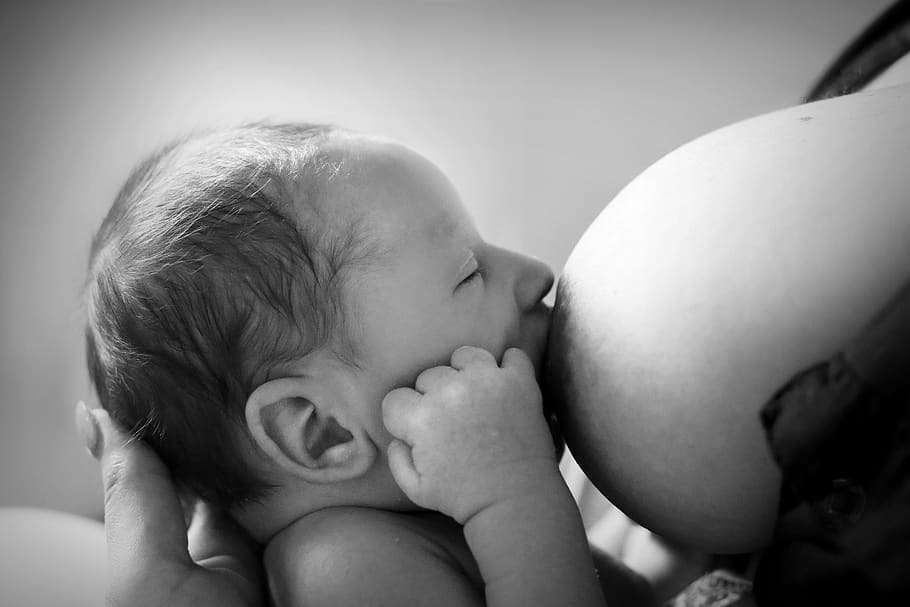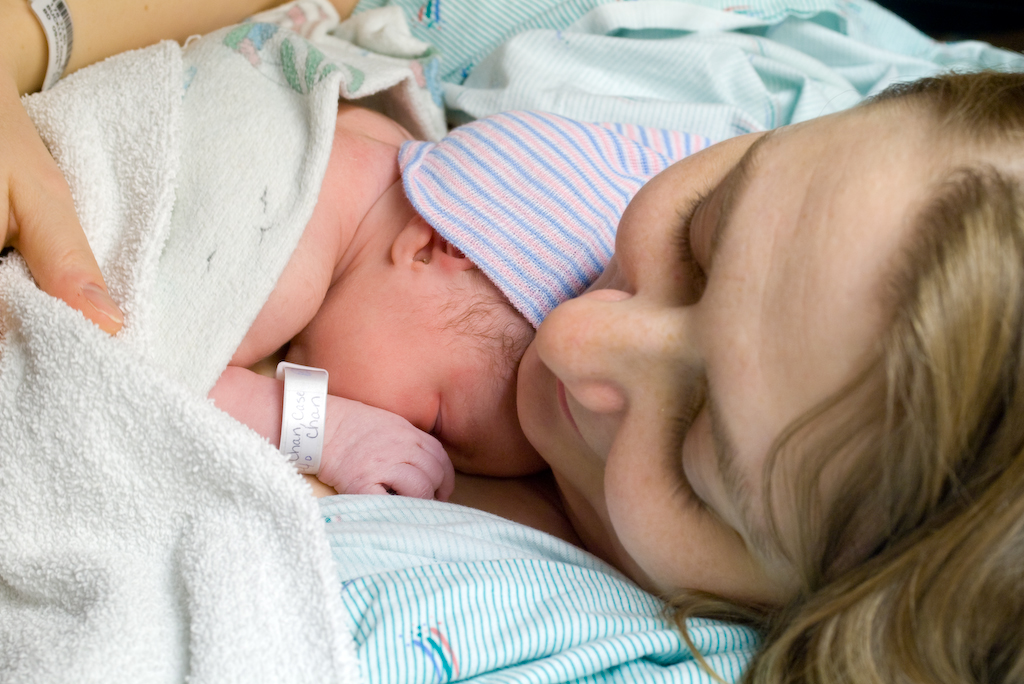
[ad_1]
The intriguing phenomenon of comparable odors in mom and child poop has lengthy fascinated scientists and curious people alike. Whereas the subject could seem uncommon, it sheds mild on the complicated interactions between numerous components reminiscent of intestine microbiota, food regimen, genetics, and metabolism.
Understanding why mother and child poop scent alike opens a window into the intricacies of our our bodies and the interconnectedness between mom and baby.
Why Mother And Child Poop Odor The Identical
Gut microbiota, consisting of trillions of microorganisms residing in our digestive tracts, performs a vital position in sustaining our well being. These microorganisms, together with micro organism, fungi, and viruses, contribute to the breakdown of meals, nutrient absorption, and even immune system regulation. They kind a dynamic ecosystem inside our our bodies, influencing quite a few points of our well-being.
The impression of intestine microbiota on poop scent is an intriguing facet of this microbial group. The micro organism residing in our guts produce numerous byproducts throughout their metabolic processes. These byproducts can embrace risky compounds that contribute to the distinct odor of feces.
Remarkably, there are similarities within the intestine microbiota between moms and infants, doubtlessly resulting in comparable poop smells. This connection suggests a switch of microbial communities from mom to baby, shaping the composition of the child’s intestine microbiota and contributing to the acquainted odor profile shared by mother and child poop.
Really helpful: Why Does My Poop Smell Like My Baby’s?
By exploring the position of food regimen, breastfeeding, genetics, and metabolism, we will achieve a deeper understanding of why mother and child poop scent alike. The meals we eat influences the composition of our intestine microbiota and, subsequently, the odor compounds produced throughout digestion.
Breastfeeding serves as a direct route for the switch of useful micro organism, additional connecting the intestine microbiota of moms and infants. Moreover, genetic components and metabolic processes contribute to the manufacturing of odor compounds, leading to a shared odor profile between mother and child.
Unraveling this stunning connection not solely satisfies our curiosity but additionally highlights the intricate nature of human biology and the outstanding methods by which our our bodies operate.
Understanding the Significance of Intestine Microbiota
The intestine microbiota performs a vital position in our total well being and well-being, and its affect extends even to the peculiar facet of the mother and child poop scent. The intestine microbiota refers back to the various group of microorganisms residing in our digestive tract. These microorganisms, together with bacteria, fungi, and viruses, work together with one another and with our our bodies in numerous methods.
In infants, the institution of a wholesome intestine microbiota is especially necessary. As infants are born with a comparatively sterile intestine, their microbiota steadily develops and diversifies through the early months of life. This course of is influenced by quite a few components, together with supply mode (vaginal delivery or C-section), early publicity to microbes, and breastfeeding.
Really helpful: Breastfeeding Health Benefits For Baby And Mother
The medical info offered on this article is offered as an info useful resource solely. This info doesn’t create any patient-physician relationship and shouldn’t be used as an alternative choice to skilled prognosis and remedy.
Apparently, research has proven that there are vital similarities between the intestine microbiota of moms and their infants. This discovering means that the switch of microbial communities from mom to baby performs an important position in shaping the composition of the child’s intestine microbiota. Consequently, this microbial switch can impression the scent of mother and child poop.

Breastfeeding itself has been discovered to facilitate the transmission of intestine microbes from mom to baby. It serves as a direct route for the switch of useful micro organism from the mom’s intestine to the child’s digestive system. This switch of microbial communities contributes to the similarities noticed within the intestine microbiota between moms and infants, doubtlessly resulting in comparable poop smells.
Moreover, metabolic processes in our our bodies additionally play a task in odor manufacturing. The breakdown of meals elements, reminiscent of proteins and sulfur-containing compounds, can generate risky substances that contribute to the distinct scent of feces. Related metabolic processes occurring in each moms and infants can result in comparable odor profiles of their respective poop.
Really helpful: Do Mixed Race Babies Have Better Genes? 10 Benefits of Biracial Children
Understanding the intricate interaction between intestine microbiota, food regimen, genetics, and metabolism gives priceless insights into the stunning connection between mother and child poop scent. By recognizing the significance of those components, researchers can delve deeper into investigating this intriguing phenomenon, doubtlessly uncovering additional well being implications and purposes.
The Affect of Weight loss program on Poop Odor
The impression of food regimen on poop odor is an enchanting facet to think about in understanding why mother and child poop scent alike. Our dietary selections instantly affect the composition of our intestine microbiota, which, in flip, impacts the manufacturing of odor compounds throughout digestion. This intricate relationship between food regimen and poop odor gives priceless insights into the connection between mother and child.
Maternal food regimen performs a big position in figuring out the composition of breast milk, which serves as the first supply of diet for infants. The vitamins and elements in breast milk are influenced by the meals consumed by the mom. For instance, sure meals wealthy in sulfur-containing compounds, reminiscent of broccoli or eggs, can contribute to the manufacturing of pungent-smelling sulfur compounds throughout digestion. Consequently, when infants eat breast milk containing these compounds, it could have an effect on the odor of their poop.
Really helpful: How To Create Secured Bonding With Your Baby
Furthermore, the presence of particular compounds in breast milk can instantly affect the odor of child poop. Breast milk accommodates numerous bioactive molecules, reminiscent of oligosaccharides, antimicrobial peptides, and antibodies. These elements not solely help the expansion of useful micro organism within the child’s intestine but additionally have the potential to impression the odor of their poop. As an example, sure oligosaccharides can act as prebiotics, selectively selling the expansion of useful micro organism that produce much less odorous byproducts throughout fermentation.
Moreover, the introduction of strong meals into the child’s food regimen may contribute to the odor of their poop. As infants transition from an unique breast milk or system food regimen to strong meals, the number of vitamins and compounds they eat expands. Meals with sturdy flavors, reminiscent of onions or garlic, can impart their traits to the poop odor. The breakdown and digestion of those meals elements within the child’s digestive system can generate risky odor compounds that contribute to the distinct scent.
It’s price noting that the impression of food regimen on poop odor shouldn’t be restricted to infants. The meals we eat as adults may affect the odor of our poop. Sure meals, reminiscent of asparagus or curry spices, are identified to supply distinct odors when digested. These odors can come up from the breakdown of sulfur compounds, fragrant compounds, or different particular elements current in these meals. Subsequently, the food regimen of each mom and toddler can contribute to the similarity within the odor profiles of their respective poop.
Really helpful: Changing A Baby’s Diaper: 6 Simple Steps (Baby Blueprint)
Mutual Microbial Switch
The switch of intestine microbes from mom to baby performs a vital position in shaping the intestine microbiota composition and, subsequently, the odor of mother and child poop. The method of microbial switch happens by means of numerous mechanisms, with breastfeeding being a major route of transmission. Breast milk accommodates a various array of useful micro organism, which might instantly colonize the toddler’s intestine and set up a microbial group.
Throughout breastfeeding, the child’s mouth comes into contact with the mom’s pores and skin, nipple, and areola, facilitating the switch of micro organism. Because the child latches onto the breast and begins suckling, microbes from the mom’s pores and skin and nipple are launched into the child’s mouth. These micro organism then journey by means of the digestive system and colonize the child’s intestine. The switch of microbial communities by means of breastfeeding contributes to the similarities noticed within the intestine microbiota between moms and infants, consequently resulting in comparable poop smells.
Really helpful: Cuddling Your Baby: Top 7 Health Benefits You Should Know
Moreover, breast milk itself accommodates particular elements that promote the expansion of useful micro organism within the child’s intestine. Human milk oligosaccharides (HMOs), as an example, act as prebiotics, offering nourishment to sure useful micro organism whereas inhibiting the expansion of dangerous microbes. These HMOs selectively help the expansion of particular bacterial species, contributing to the institution of wholesome intestine microbiota within the toddler.
Along with breastfeeding, the mode of supply additionally influences the switch of intestine microbes from mom to baby. Throughout vaginal delivery, infants are uncovered to a wealthy array of maternal vaginal and fecal microbes, which start to colonize the child’s intestine. These early colonizers play a vital position in shaping the preliminary intestine microbiota composition. In distinction, infants born by way of cesarean part have restricted publicity to those vaginal and fecal microbes, leading to a unique preliminary microbial group.
Understanding the method of mutual microbial switch sheds mild on the connection between mother and child poop scent. The switch of useful micro organism from the mom to the toddler by means of breastfeeding establishes a shared microbial group, contributing to the similarities in intestine microbiota and subsequent poop odor. Moreover, the mode of supply additional influences the preliminary colonization of the toddler’s intestine, doubtlessly impacting the long-term intestine microbiota composition and odor profiles.
Really helpful: 7 Pregnancy Lifestyles That Are Dangerous For Baby And Mother
Genetic Elements and Metabolism
Genetic components and metabolism contribute to the manufacturing of odor compounds in our our bodies, thereby enjoying a task within the similarity of poop scent between moms and infants. Our genes affect numerous points of our metabolism, together with the breakdown of meals elements and the manufacturing of risky compounds throughout digestion. Sure genetic similarities between moms and infants can result in the manufacturing of comparable odor compounds, leading to comparable poop smells.

Genetic variations in enzymes concerned within the metabolism of particular compounds can affect the manufacturing of odorous byproducts. For instance, some people possess genetic variants that have an effect on their capacity to metabolize sulfur compounds current in sure meals. These sulfur compounds, when not effectively metabolized, can result in the manufacturing of foul-smelling sulfur-containing gases throughout digestion. If moms and infants share comparable genetic variations in these enzymes, it could contribute to the resemblance of their poop scent when consuming meals containing these compounds.
Metabolic processes occurring in our our bodies additionally contribute to the discharge of odor compounds in our poop. Throughout digestion, meals elements are damaged down and bear numerous metabolic transformations. This course of can generate risky substances that contribute to the distinct odor of feces. Related metabolic processes in each moms and infants can result in the manufacturing of comparable odor profiles of their respective poop.
Really helpful: Top 5 Appetite Suppressants For Breastfeeding Moms
Moreover, the genetic makeup of people can affect the composition of their intestine microbiota, which in flip impacts poop odor. Studies have proven that genetic components contribute to the variation in intestine microbial communities amongst people. The presence of particular microbial species and their metabolic actions can affect the manufacturing of odor compounds throughout digestion. Subsequently, shared genetic components between moms and infants might contribute to similarities of their intestine microbiota composition and subsequent poop odor.
FAQs
Why do mother and child poop scent alike?
The similarity in poop odor between mothers and infants might be attributed to a mixture of things, together with the switch of intestine microbes, food regimen, genetics, and metabolism. The shared intestine microbiota between moms and infants, notably by means of breastfeeding, performs a big position in shaping poop odor.
What components contribute to the similarity in poop odor between moms and infants?
A number of components contribute to the resemblance in poop scent between moms and infants. These embrace the switch of microbial communities by means of breastfeeding, shared genetic variations influencing odor compound manufacturing, comparable metabolic processes within the physique, and the impression of food regimen on the composition of breast milk and the meals consumed by infants.
How does the intestine microbiota affect poop odor in mothers and infants?
The intestine microbiota, consisting of microorganisms within the digestive tract, influences poop odor in mothers and infants. The microbial communities produce byproducts throughout digestion, together with risky compounds that contribute to the distinct scent of feces. Similarities within the intestine microbiota composition between moms and infants can lead to comparable poop smells.
Does food regimen play a task within the similarity of poop scent between moms and infants?
Weight loss program performs a vital position in figuring out poop odor for each moms and infants. Maternal food regimen influences the composition of breast milk, which might comprise particular compounds that have an effect on the odor of child poop. Moreover, the introduction of strong meals to infants expands the vary of vitamins and compounds they eat, additional impacting poop odor.
What’s the impression of breastfeeding on the odor of child poop?
Breastfeeding has a direct impression on the odor of child poop. Breast milk accommodates useful micro organism and elements like human milk oligosaccharides (HMOs) that help the expansion of useful intestine micro organism in infants. These components can affect the composition of the toddler’s intestine microbiota and subsequently have an effect on the odor of their poop.
Really helpful: The Best Surrogacy Georgia Agency: Why Is It The Best Choice For Your Couple?
Are there genetic components that contribute to the resemblance in poop scent between moms and infants?
Genetic components can contribute to the resemblance in poop scent between moms and infants. Variations in genes concerned within the metabolism of particular compounds can affect the manufacturing of odorous byproducts throughout digestion. Shared genetic variations between moms and infants can lead to comparable patterns of odor compound manufacturing and, consequently, comparable poop smells.
How do metabolic processes have an effect on poop odor in mothers and infants?
Metabolic processes occurring within the physique play a task in poop odor. Meals elements bear numerous metabolic transformations throughout digestion, producing risky substances that contribute to the distinct odor of feces. Related metabolic processes in moms and infants can result in the manufacturing of comparable odor profiles of their respective poop.
Can the switch of intestine microbes from mom to baby clarify the similarity in poop odor?
Sure, the switch of intestine microbes from mom to baby will help clarify the similarity in poop odor. Throughout breastfeeding, useful micro organism from the mom’s pores and skin and nipple are transferred to the child’s mouth and digestive system. These micro organism colonize the child’s intestine and contribute to the shared microbial group, impacting the odor of poop.
Are there particular meals that may trigger comparable poop smells in mothers and infants?
Sure meals can contribute to comparable poop smells in mothers and infants. Meals containing sulfur compounds, reminiscent of broccoli or eggs, can produce pungent-smelling sulfur compounds throughout digestion. Strongly flavored meals like onions or garlic may impart their traits to the odor of poop when consumed by each moms and infants.
Really helpful: Are Mixed Race Babies Healthier?
What are the sensible implications of understanding the connection between mother and child poop scent?
Understanding the connection between mother and child poop scent has sensible implications. It may well contribute to the event of interventions and therapies aimed toward selling wholesome intestine microbiota in infants. Moreover, personalised dietary suggestions contemplating the impression of poop odor might be developed to help intestine well being. Additional analysis on this subject might result in sensible purposes for addressing gut-related well being points and total well-being.
Conclusion
The connection between mother and child poop scent might be attributed to a number of components. The intestine microbiota, influenced by mutual microbial switch by means of breastfeeding, performs a big position in shaping the odor of poop in each moms and infants. Weight loss program, notably the maternal food regimen throughout breastfeeding and the introduction of strong meals to infants impacts the composition of breast milk and the vary of vitamins and compounds within the child’s digestive system, finally affecting poop odor. Genetic components and metabolism contribute to the manufacturing of odor compounds throughout digestion, and shared genetic similarities between moms and infants can lead to comparable poop smells.
Understanding these components gives priceless insights into the connection between mother and child poop scent and highlights the intricate nature of our our bodies. Additional analysis on this subject can uncover extra particular mechanisms and implications, resulting in potential purposes in selling intestine well being and personalised dietary suggestions. Total, embracing this connection emphasizes the complexity of human biology and underscores the significance of a holistic strategy to intestine well being and total well-being.
[ad_2]